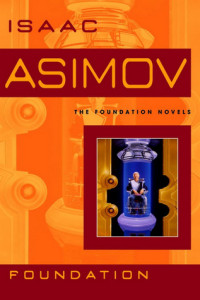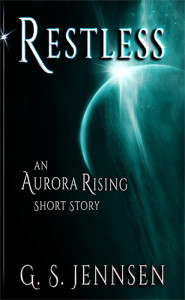For this week’s Flashback Friday post, I’m happy to have science-fiction author, G. S. Jennsen, here for a guest post on how the Foundation Series influenced her as a writer.
 When asked if there is a science fiction novel, author or series that I read when I was young which impacted my life and my journey as a writer, there has always been only one answer for me: The Foundation Series by Isaac Asimov.
When asked if there is a science fiction novel, author or series that I read when I was young which impacted my life and my journey as a writer, there has always been only one answer for me: The Foundation Series by Isaac Asimov.
Foundation wasn’t the first science fiction novel I ever read, and it was probably about the four-thousandth novel I had read when I stumbled upon it at the age of 13 (I was a bit of a bookworm from a very young age). So why did this series have such a lasting impact?
The world of the Foundation novels was BIG. It imagined a civilization spread out over thousands of worlds. And while it took place in a future so distant that Earth was an all-but-forgotten fable, the people who inhabited this future were still fundamentally us, making it relatable to a young teenager. Atop of this expansive tableau, Asimov proceeded to tell a big story—nothing less than the fate of humanity is at stake. And he asks the big questions, though the biggest question is also the smallest, most individual one: are we in control of our own fate?
See, Asimov was a tricky guy. The series opens with the premise that on a large enough scale, human behavior—and the course of civilization—can be predicted. And if it can be predicted, it can be controlled. Society is presented as a vast, mindless mob which must be guided and managed.
Yet as the story moves forward, individuals play a larger and larger role in the resolution of events. One very unique man all but destroys civilization; one spunky teenage girl helps to save it. At the end of Book 5, the future direction of the galaxy is decided by a single man. Eventually even the proponents of controlling the masses admit their approach cannot predict with sufficient accuracy the effects of extraordinary, unforeseeable individuals—and it is precisely those sorts of individuals who change the course of history.
Given my relative obsession with these novels throughout my high school years, it’s perhaps interesting that at the end of the day, I disagree with Asimov’s view on humanity. While throughout the books he presents both sides of the argument, it’s impossible to miss his preference for a non-individualistic, group-oriented approach. Tellingly, in the finales of both Book 4: Foundation’s Edge and Book 5: Foundation and Earth, a ‘group consciousness’ is chosen as the best future for humanity. And while Asimov crafted a story in which ‘extraordinary, unforeseeable individuals’ have a tremendous impact, I’m not certain he viewed this impact as a good thing.
This conclusion bothered me enough that I wrote my AP English term paper on the topic of “Free Will vs. Determinism as Explored in Isaac Asimov’s Foundation Novels”—thus forever cementing my status as ‘ridiculous nerd’ among my classmates. At this point none of them are remotely surprised by the science and space-themed content of most of my Facebook updates. My teacher had no idea what to make of it. She did give me an ‘A,’ if only to avoid having to admit she didn’t understand the subject matter. Oh, how I wish I still had that term paper….
Now, nearly 30 years after I discovered Foundation and as I put the finishing touches on my first science fiction trilogy, I can see echoes of Asimov’s galactic scope and stakes in my writing. But in my novels, individuals unequivocally matter. One could even argue a continuing theme in my novels is that the uniqueness of each individual, and their diversity en masse, is what makes humanity strong.
I often wonder if I would have adopted this belief so strongly if I hadn’t been pushed by the Foundation series to consider the question—and the opposing viewpoint—at an age when I was still figuring out how to feel about such things. These novels, and Asimov’s genius, multi-layered storytelling, provided me perhaps the first opportunity to understand, internalize and begin to evaluate two radically different worldviews.
Ultimately they provided me a framework against which to evaluate the world around me.
G. S. Jennsen’s latest work is Restless: An Aurora Rising Short Story—
 Space is vast and untamed, and it holds many secrets. Now two individuals from opposite ends of settled space are on a collision course with the darkest of those secrets, even as the world threatens to explode around them.
Space is vast and untamed, and it holds many secrets. Now two individuals from opposite ends of settled space are on a collision course with the darkest of those secrets, even as the world threatens to explode around them.
…or they will be, in about 8 years. Restless is a short story prequel to Starshine, Book One of the Aurora Rising trilogy.
Before Alex Solovy was a successful interstellar scout, she was building starships and planning for the day when she would fly one she called her own. Before Caleb Marano was wiping out the terrorist group who murdered his mentor, he was…wiping out terrorist groups who murdered shopkeepers and threatened his friends.
Catch a glimpse of Aurora Rising’s heroes while they were still becoming the individuals they will need to be in order to face the galactic threat which, for now, waits silently in the void.
Click here to read other Flashback Friday posts by other authors including Jean Walker, GG Silverman, and more.


